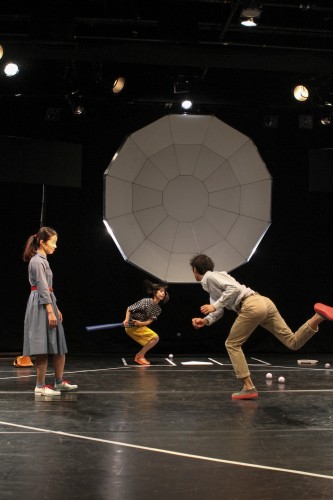
Toshiki Okada steps up to the plate with his political allegory, GOD BLESS BASEBALL (photo © Julie Lemberger)
Japan Society
333 East 47th St. at First Ave.
January 14-17, $35
212-715-1258
www.japansociety.org
www.publictheater.org
Toshiki Okada uses America’s national pastime to explore the relationship between Japan, Korea, and the United States in God Bless Baseball, making its North American premiere this weekend at Japan Society as part of the Public Theater’s Under the Radar Festival. The Yokohama-born playwright and director doesn’t begin God Bless Baseball with the traditional “Take Me Out to the Ball Game” but instead with “Mickey Mouse March,” the theme from The Mickey Mouse Club, as two young women, one Korean (Sung Hee Wi), one Japanese (Aoi Nozu), take the stage. Sung and Aoi are marvelous, their odd gestures, a hallmark of Okada’s style, epitomizing “awkward” as they discuss how they don’t understand the rules of baseball. They are standing at the front of controversial visual artist Tadasu Takamine’s primarily black set: a small baseball diamond with four white bases; a pair of scoreboard-like monitors, one for Korean, the other for Japanese surtitles; a bucket of balls; and a twelve-sided polygon high on the wall behind home plate; the quirky costumes are by Kyoko Fujitani. The two women are soon joined by a man (Yoon Jae Lee) who attempts to explain the rules of the game, even though he admits that he is not a fan of the sport. They delve into offense and defense, strikes and innings, free time and boredom, and how their fathers love the game. “OK, so that’s all clear and great but I still don’t really understand like what kind of sport baseball is, ultimately,” the Japanese girl says. “For those of us who don’t understand anything about baseball, it was honestly pretty opaque,” the Korean girl adds. Soon an Ichiro impersonator (Pijin Neji) arrives, carrying a bat and wearing the Seattle great’s number, 51, on the back of his spectacularly hip hoodie. He references the March 2006 controversy when Ichiro, playing for Japan against Korea in the World Baseball Classic, may or may not have dissed his opponents, which set off a new hostility between two nations that already had a bad history. “It was just a misunderstanding,” Ichiro says while taking practice cuts. Things get even more surreal when the polygon starts talking to the characters in a disembodied voice that is part umpire, part godlike figure. “It’s no use lying to me,” the very American voice intones. “Place your hand upon your heart and tell me the truth.”
Okada, who has previously presented such works as Hot Pepper, Air Conditioner, and the Farewell Speech and Five Days in March at Japan Society with his chelfitsch theater company, creates just the right mood in this clever allegory, capturing the complications of not only the game of baseball itself but the relationships between parents and children as well as political tensions in Asia. Casting America as the spiritual father of Korea and Japan when it comes to baseball, two cousins who do not get along very well, Okada also throws in a few fastballs at corporate culture, gently mocking sponsorship and the more capitalist aspects of the sport. The four actors are excellent, especially in a late dance segment in which they give up control of their bodies. And as a sweet bonus, when you enter Japan Society, you’ll be met by two women hawking small, adorable bags of Tohato caramel corn. You definitely don’t need to know anything about baseball to enjoy this delightful, metaphorical romp, so don’t be afraid to step up to the plate and take a swing.